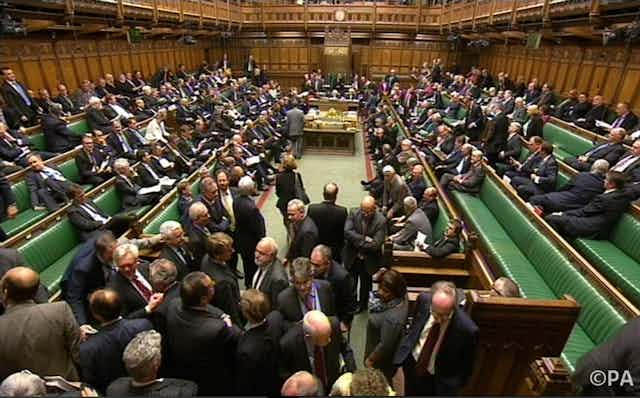When more than 100 Conservative MPs vote for an amendment to their own government’s Queen’s Speech, it is more than a rebellion - it is historically unprecedented.
And despite David Cameron’s insistence that he remains “relaxed” about the outcome of last night’s Commons vote, the size of the vote comes as a stark reminder of his party’s glass jaw when it comes to Europe.
The last time government MPs voted for an amendment to their party’s own Queen’s Speech, it was the Labour Party in 2004 – but then there were just three of them.
To find an example before that (or, indeed, to find the last time an amendment to the Queen’s Speech debate was initiated by MPs on the government side), you have to go back as far as 1946, when 45 Labour MPs voted for an amendment on the subject of conscription, and more than 90 abstained.
But before yesterday, there is not a single example of a Conservative MP voting for an amendment to their own government’s legislative programme. Nor – just as tellingly – is there an example of a party announcing a free vote (even a partial one) on its own Queen’s Speech, as the Conservatives did yesterday.
In 1946 there was no free vote for backbenchers. Attlee (never one to announce himself “relaxed” about these sorts of things) and his whips took the conscription revolt on the chin.

In part, the government’s difficulties this week are just further evidence that MPs are today more willing to rebel than in the past. The old chestnut of today’s MPs being lobby fodder – whereas MPs in the past were brave and independent – has now been so regularly disproved that it is embarrassing to hear it still being repeated.
This week, my colleague Mark Stuart and I published our most recent study of backbench dissent. The rates of rebellion by government MPs remain high (there was a rebellion in 27% of Commons votes, which tops the comparable figure for all but nine post-war sessions) and the parliament as a whole is on course to be the most rebellious in the post-war era.
But Europe has long been a running sore for the Conservative party. Rebellions on other issues come and go; the legislation is passed, or falls, tempers calm, the poison drains, people move on. But Europe seems to be a chronic ailment to the Conservative body politic; there is always a summit, a treaty amendment, a budget, to cause the fever to return.

The nature of split has changed, though. The old battles – between “pro-Europeans” and “Eurosceptics” (the labels are crude and contested, but necessary) are now largely over, the former now just a marginalised rump, consisting of a few old timers like Ken Clarke and a handful of newer MPs who keep their unusual enthusiasms firmly in the closest.
The battle lines for the Conservatives today are between gradations of scepticism, between those sceptical about the EU and the better-off-outers. Thus far Europe has accounted for just 18% of the Conservative rebellions so far this Parliament, but 36% of all the rebellious votes that had been cast by Conservative MPs against the whips. This is the third Conservative whopper on Europe since 2010.
And for those who remember the European difficulties of the Major government – with whom David Cameron is being increasingly compared – it is worth noting that the current rebellions are much larger. The largest rebellion over the Maastricht Bill – then seen as the worst example of Tory Euro-infighting – saw 41 Conservative MPs defy their party line. Today’s whips would sell their souls for a revolt as small as 41.
It is no good saying – as some will – that this wasn’t a “rebellion” because it was a free vote. Formally, that may be true. But why was it made a free vote? Because the government knew they faced an enormous rebellion.
Even worse, in an attempt to head off this non-rebellion rebellion, the Conservatives published a referendum bill which they have pledged to introduce, somehow, into the Commons before the election. They’re now stuck with that, yet another flashpoint to cause trouble in the coming months.
The public repeatedly say in opinion polls that they like MPs to display independence, not to be too slavish to the party line. But at the same time, they dislike divided parties.
That was, or should have been, the main lesson of the Major government. Divisions over Europe crippled that government and destroyed it at the election in 1997. It didn’t matter that then, just as now, on the issue itself the Conservatives were the party most in line with the voters; all the voters see is a party falling in on itself.

